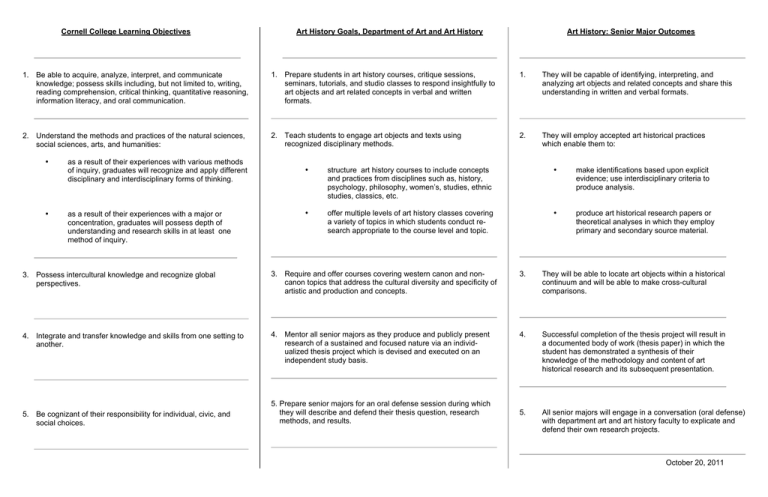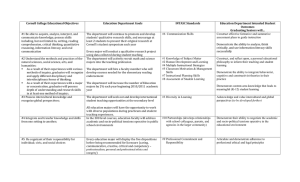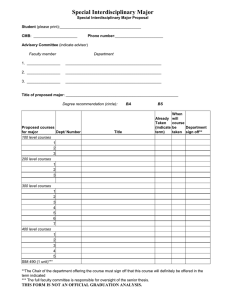Cornell College Learning Objectives Art History: Senior Major Outcomes
advertisement

Cornell College Learning Objectives Art History Goals, Department of Art and Art History Art History: Senior Major Outcomes 1. Be able to acquire, analyze, interpret, and communicate knowledge; possess skills including, but not limited to, writing, reading comprehension, critical thinking, quantitative reasoning, information literacy, and oral communication. 1. Prepare students in art history courses, critique sessions, seminars, tutorials, and studio classes to respond insightfully to art objects and art related concepts in verbal and written formats. 1. They will be capable of identifying, interpreting, and analyzing art objects and related concepts and share this understanding in written and verbal formats. 2. Understand the methods and practices of the natural sciences, social sciences, arts, and humanities: 2. Teach students to engage art objects and texts using recognized disciplinary methods. 2. They will employ accepted art historical practices which enable them to: • • as a result of their experiences with various methods of inquiry, graduates will recognize and apply different disciplinary and interdisciplinary forms of thinking. as a result of their experiences with a major or concentration, graduates will possess depth of understanding and research skills in at least one method of inquiry. • structure art history courses to include concepts and practices from disciplines such as, history, psychology, philosophy, women’s, studies, ethnic studies, classics, etc. • make identifications based upon explicit evidence; use interdisciplinary criteria to produce analysis. • offer multiple levels of art history classes covering a variety of topics in which students conduct research appropriate to the course level and topic. • produce art historical research papers or theoretical analyses in which they employ primary and secondary source material. 3. Possess intercultural knowledge and recognize global perspectives. 3. Require and offer courses covering western canon and noncanon topics that address the cultural diversity and specificity of artistic and production and concepts. 3. They will be able to locate art objects within a historical continuum and will be able to make cross-cultural comparisons. 4. Integrate and transfer knowledge and skills from one setting to another. 4. Mentor all senior majors as they produce and publicly present research of a sustained and focused nature via an individualized thesis project which is devised and executed on an independent study basis. 4. Successful completion of the thesis project will result in a documented body of work (thesis paper) in which the student has demonstrated a synthesis of their knowledge of the methodology and content of art historical research and its subsequent presentation. 5. All senior majors will engage in a conversation (oral defense) with department art and art history faculty to explicate and defend their own research projects. 5. Be cognizant of their responsibility for individual, civic, and social choices. 5. Prepare senior majors for an oral defense session during which they will describe and defend their thesis question, research methods, and results. October 20, 2011


